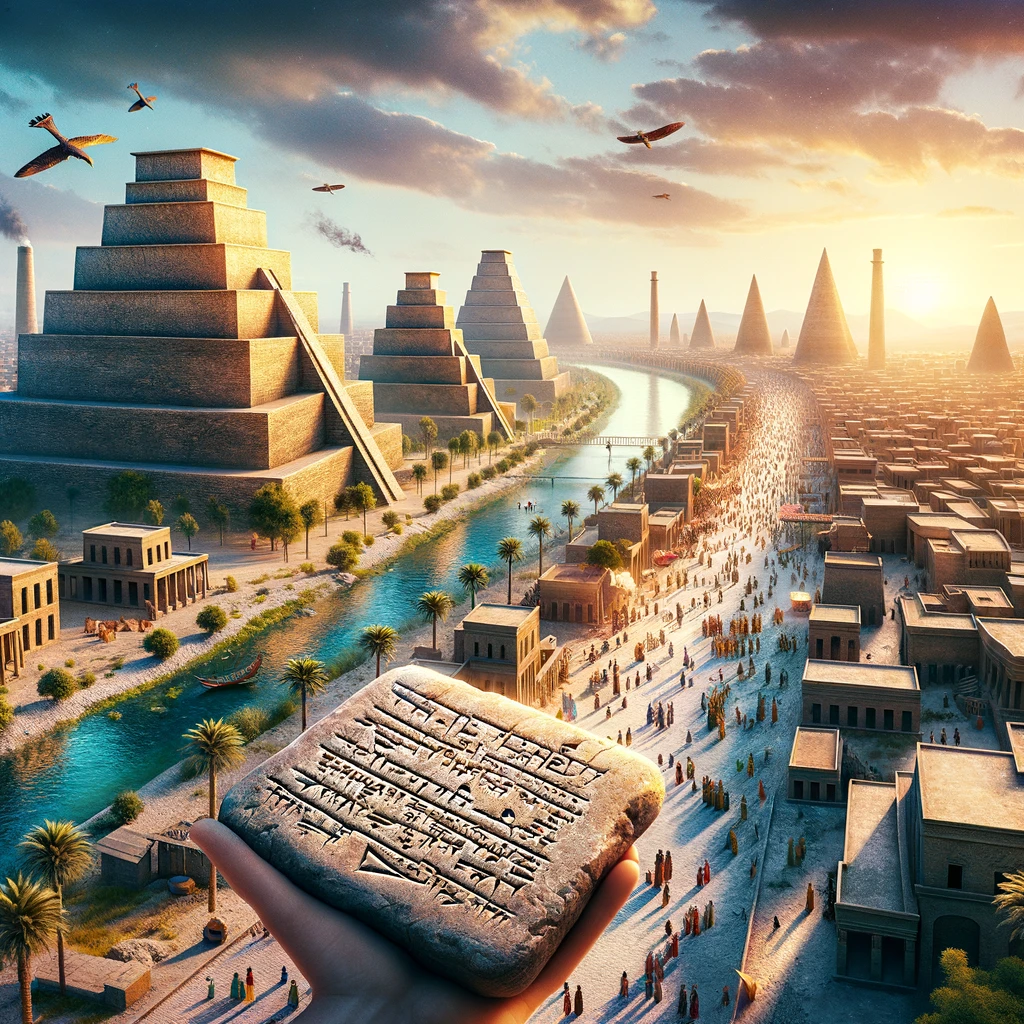Welcome to the bustling streets of ancient Mesopotamia, the cradle of civilization where the beer flowed freely, the ziggurats touched the heavens, and laws were tougher than a two-day-old loaf of bread. Before the days of Wi-Fi, Netflix, and indoor plumbing, the Mesopotamians were busy laying down the legal and governmental blueprints that would shape the future of mankind. So, buckle up! You’re about to take a whirlwind tour through history’s most epic governance saga.
Mesopotamia 101: A Quick History Trip
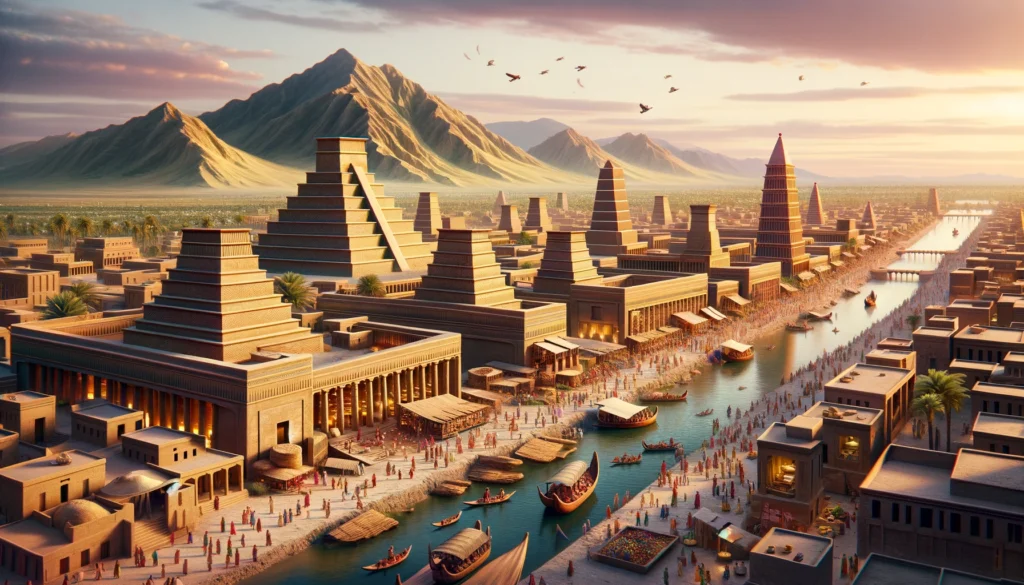
Let’s set our time machines to way, way back—when “text” was something you chiseled on a tablet, and “followers” were people following you. Nestled between the mighty Tigris and Euphrates rivers, Mesopotamia was more happening than any ancient world Instagram feed. This place was the OG of civilization; where city-states like Uruk, Ur, and Babylon were the New Yorks, Londons, and Tokyos of their day.
But what made these city-states tick wasn’t just their impressive architecture or knack for agriculture—it was their revolutionary approach to law and government. And by revolutionary, we mean a mix of divine decree, royal power plays, and the world’s first attempt at bureaucracy that didn’t involve filling out forms in triplicate.
The rule makers: Kings, Priests, and Admins
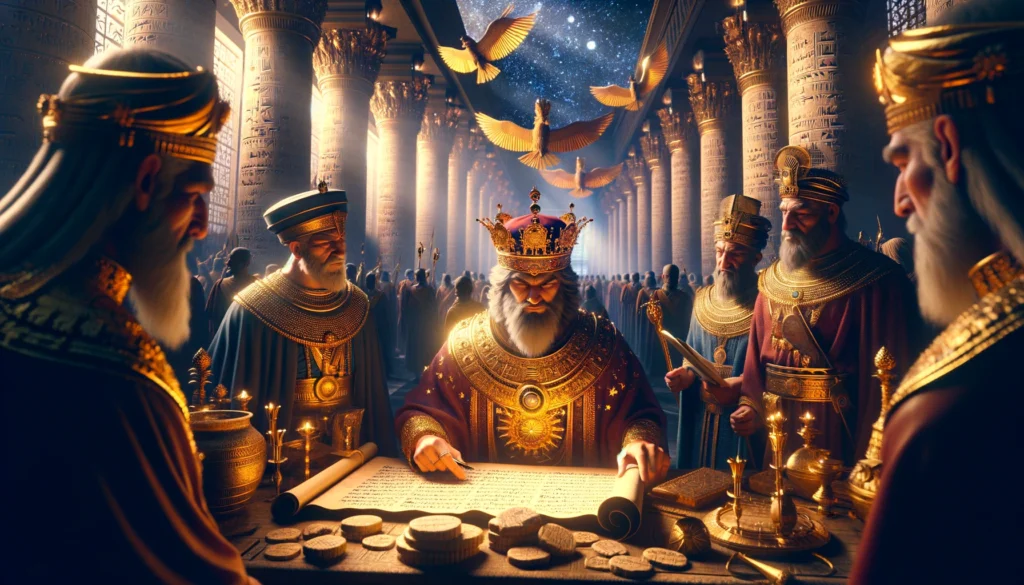
Imagine being a king in ancient Mesopotamia. You’re not just a ruler; you’re a living god, a military commander, and the head of state all rolled into one. Your best buds? The high priests, who help you keep the gods on your side, and a squad of scribes and administrators who make sure your decrees are the talk of the town.
A day in the life of a Mesopotamian king involved consulting the stars (literally), making laws that ranged from property rights to punishing tavern keepers who watered down beer, and leading your troops into battle when your neighbors got a little too cheeky. It was a tough job, but hey, someone had to do it.
Lawmaking Mesopotamian Style
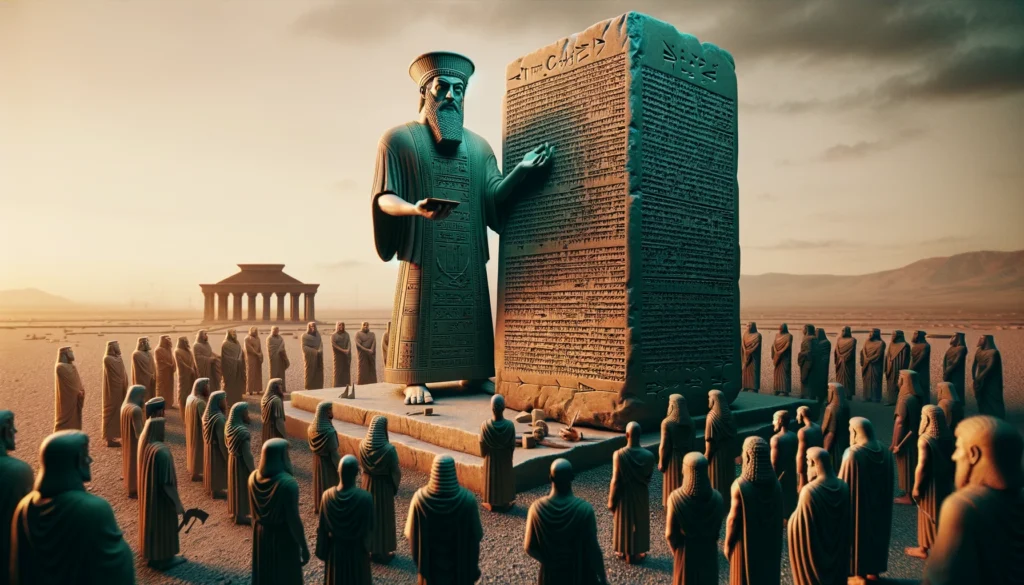
Enter Hammurabi, the Beyoncé of ancient lawgivers, dropping his Code like it was the hottest mixtape of the 18th century BCE. Hammurabi’s Code wasn’t just a list of dos and don’ts; it was a groundbreaking legal document that covered everything from family law to professional malpractice, making sure that everyone from the elite to the commoners played by the rules.
“An eye for an eye” might sound harsh by today’s standards, but back then, it was all about fairness and accountability. Steal something? Say goodbye to your hand. Mess with someone’s property? You might find yourself literally in deep water. Hammurabi’s laws were the talk of the Mesopotamian water coolers, setting the standard for justice and order.
Continuing with the development of our article, let’s dive deeper into the fabric of ancient Mesopotamian society, exploring the class system, the economy, and the complexities of war and diplomacy, all while keeping our content lively and engaging.
Society’s Backbone: The Class System
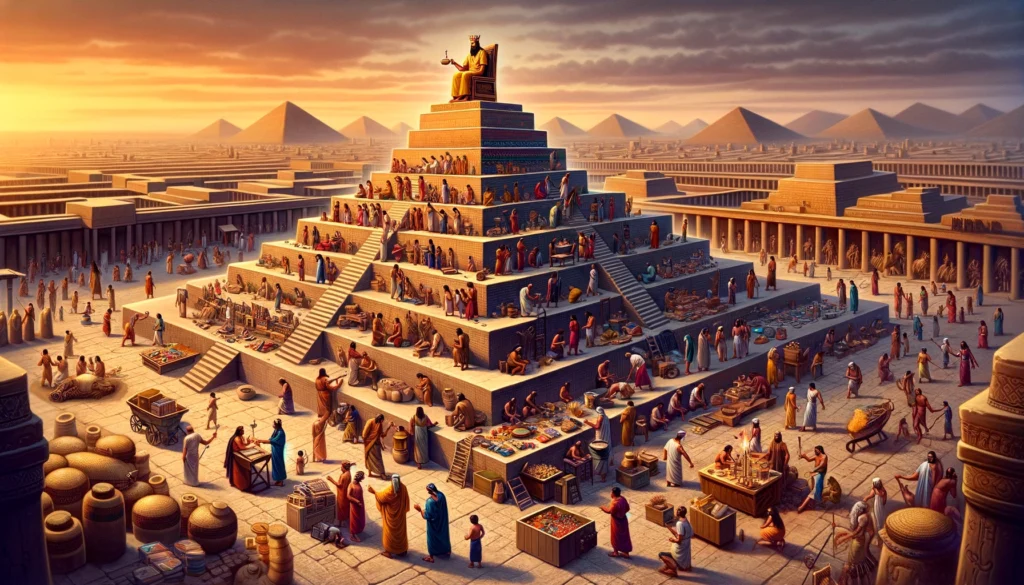
Let’s talk social ladder – Mesopotamian style. Imagine society as a giant ziggurat. At the top, you’ve got the VIP lounge for gods, kings, and priests – the original A-listers. Just below them, were the nobles and officials, throwing the ancient equivalent of red-carpet events. Then come the professionals – the doctors, merchants, and brewers, basically the middle class, keeping the economy buzzing like a busy marketplace. And at the base? The common workers and farmers, the backbone of society, plus the slaves, did the grunt work nobody else wanted.
Now, meet Enkidu, our fictional commoner, possibly a brewer, because let’s face it, beer was a big deal in Mesopotamia (they even paid wages in it!). Enkidu’s daily grind involved more than just brewing; it was navigating the social intricacies of ancient city life, from appeasing the temple priests with his finest ale to dealing with the occasional overly entitled noble. His story gives us a peek into the complexities and nuances of social mobility (or often, its absence) in ancient Mesopotamia.
Economy and Taxes: The Original Paycheck to Paycheck
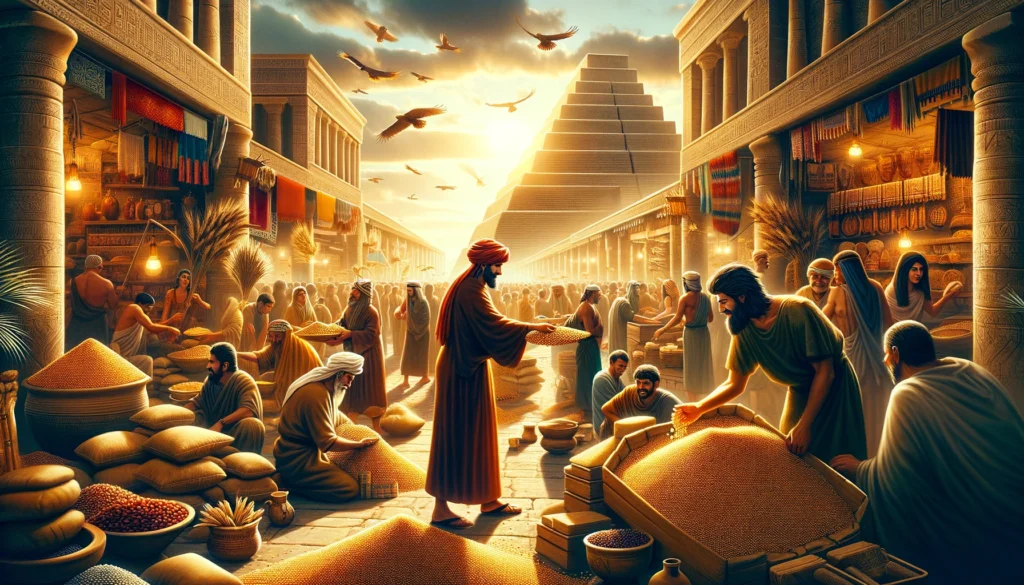
“Got my paycheck in barley, again!” – probably every Mesopotamian worker ever. The economy in ancient Mesopotamia was as vibrant as a bustling bazaar. It was all about trade, agriculture, and, yes, taxes. The concept of “giving to Caesar” has nothing on these folks. Imagine tax day, but instead of software and paperwork, you’re hauling your grain and livestock to the temple as your civic duty.
And let’s not forget the innovation of the shekel – not just a coin, but a whole weight system that kept the economy somewhat fair. “Fair” unless you were trying to dodge those temple taxes, in which case, you might find yourself in a divine audit, and nobody wanted that.
War and Diplomacy: The Art of Ancient Politics
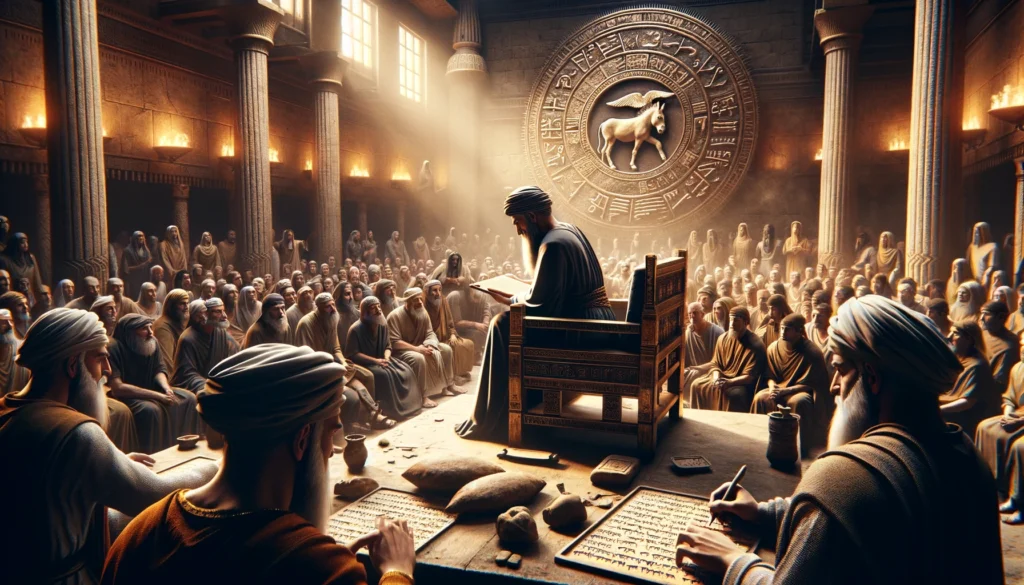
If you thought modern politics was a tangled web, Mesopotamian rulers were the original masters of the political chess game. Picture this: your neighbor’s city-state has a resource you covet. Do you a) send a diplomatic envoy with a generous gift, b) marry off your sister to their king, or c) muster your chariots for a surprise visit? If you’re a Mesopotamian king, the answer is usually “all of the above.”
Wars were as much about showing off military might as they were about securing resources and alliances. And when it came to diplomacy, Mesopotamians were adept at forging relationships that could turn enemies into frenemies – at least until the next harvest season.
- Religion’s Role in Governance: Dive into how the gods were considered the ultimate rulers and how their divine will was interpreted and implemented by the kings and priests. Maybe add a humorous anecdote about a deity’s peculiar demands and how it affected city planning or lawmaking.
- Justice and Punishment: Order in the Courts: Get into the nitty-gritty of the courtroom dramas. Picture a trial over a disputed donkey sale turning into a community event, showcasing the blend of law, custom, and a bit of divine intervention in the verdict.
- Legacy of Mesopotamian Laws and Government: Wrap up by connecting the dots between ancient Mesopotamian innovations in governance and our modern legal and political systems. Highlight how concepts like written laws, trials, and even the idea of government accountability have roots deep in the Mesopotamian era.
By maintaining a balance between informative content and an entertaining delivery, peppered with modern analogies and humorous asides, this article will not only enlighten readers about Mesopotamia’s rich history but also keep them engaged and eager to learn more about the past’s impact on our present. As we draw our Mesopotamian saga to a close, let’s delve into the final chapters of our ancient tale, exploring the divine influence on governance, the gritty reality of justice and law enforcement, and the enduring legacy of Mesopotamian civilization on modern legal and governmental systems.
Religion’s Role in Governance: The Celestial Administration
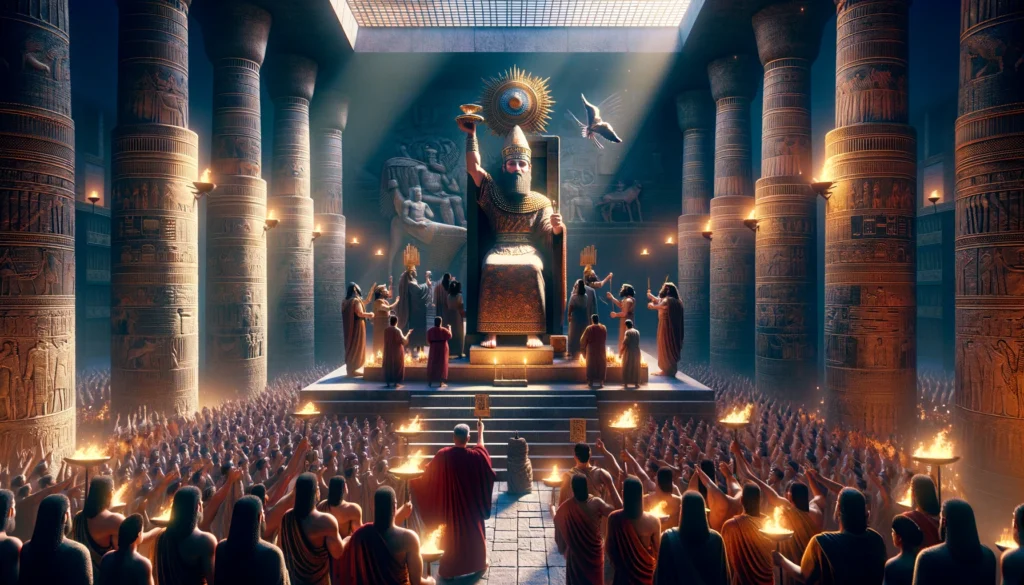
In Mesopotamia, religion wasn’t just a part of life; it was the CEO, the manager, and the intern, all rolled into one. Kings were seen as chosen by the gods, not just ruling in their cities but serving as the high priests, the middlemen between the heavens and earth. This divine endorsement wasn’t taken lightly—it meant that laws and decrees often came with a godly seal of approval, making them unquestionable.
Imagine if your mayor was also your priest, and tax laws were considered divine commands. Skipping on taxes wasn’t just illegal; it was sacrilegious. And let’s not even start on zoning laws ordained by the gods. “Sorry, Enkidu, you can’t build your brewery here. Inanna needs her space.”
Justice and Punishment: Order in the Courts
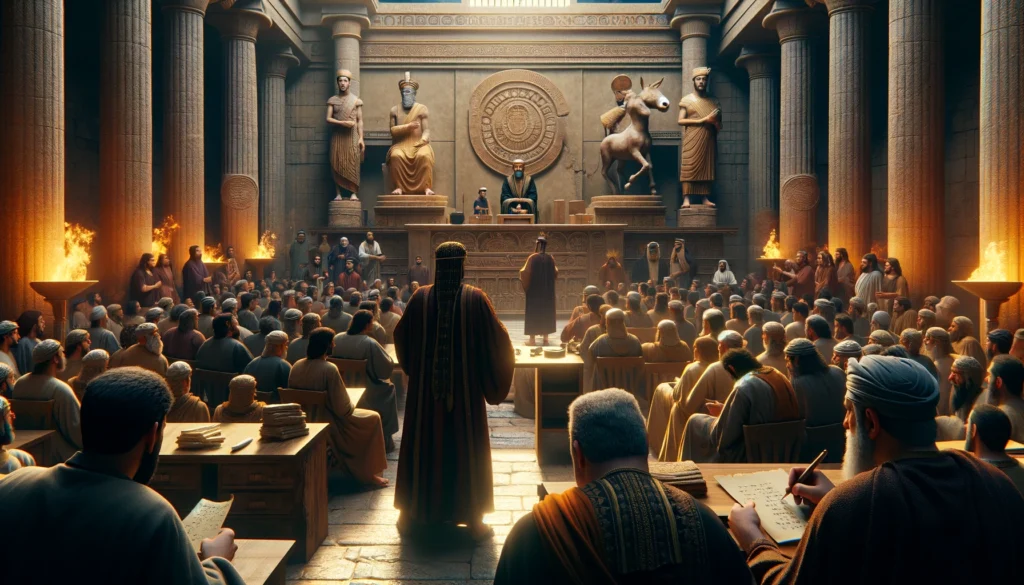
Step into a Mesopotamian court, and you’ll find a scene that’s part Judge Judy, part divine oracle. The laws were clear, written down for all to see on massive stone tablets (take that, fine print!), but the interpretation? That’s where things got spicy. With gods in the mix, a simple property dispute could escalate to invoking divine omens. And punishments were no slap on the wrist—these were lessons meant to last a lifetime (or, at least, severely inconvenience you).
Yet, it wasn’t all fire and brimstone. The law aimed at fairness, a balance that ensured society functioned smoothly. If someone wronged you, you could expect compensation—just make sure you had your facts straight, or you might end up paying the price… literally.
Legacy of Mesopotamian Laws and Government
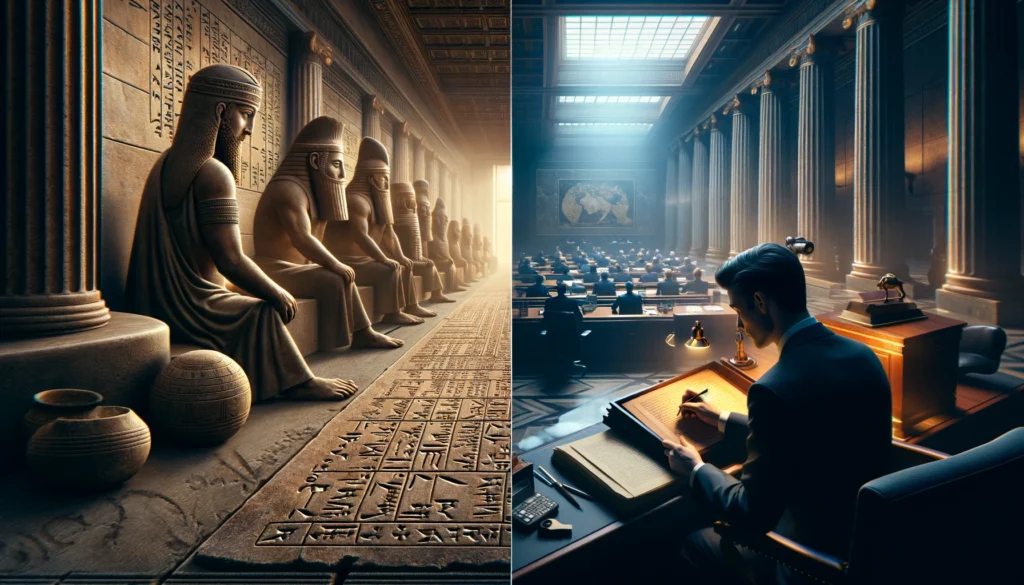
As we bid adieu to the dust-covered streets and towering ziggurats of ancient Mesopotamia, it’s clear that this wasn’t just a chapter in our history books; it’s the prologue to our modern civilization. The echoes of Mesopotamian governance ring through our legal systems, our concepts of justice, and even our bureaucratic red tape.
Hammurabi’s Code? It’s the ancestor of every terms of service agreement you’ve never read. Those ancient taxes? They paved the way for our modern economic systems. And the intricate dance of diplomacy and war? Let’s just say, the game’s rules haven’t changed much, only the players.
So, next time you groan about filing your taxes or roll your eyes at legal jargon, give a little nod to our Mesopotamian forebears. They might not have had smartphones or social media, but when it came to laying down the law and governing the masses, they were ahead of their time. In the grand tapestry of human history, Mesopotamia was where we first learned to write the rules—quite literally.
And there you have it—a journey back in time to the land between two rivers, where civilization took its first steps and where the foundations of law and government were laid for generations to come. Mesopotamia reminds us that our quest for order, justice, and governance is as ancient as the rivers that nurtured the first cities. It’s a testament to humanity’s enduring spirit, our relentless pursuit of community, and our eternal search for a fair shake under the law.
CONCLUSION
As we conclude our exploration of “Law and Government in Mesopotamia,” it’s evident that this ancient civilization was not just a chapter in the dusty annals of history, but a cornerstone in the edifice of human civilization. The legacy of Mesopotamia is a testament to human ingenuity, the quest for justice, and the complex interplay between divine and earthly governance. It’s a narrative that underscores the unbroken thread connecting past and present, illuminating the continuity of human endeavor to organize society, uphold justice, and govern with a balance of power and morality.
